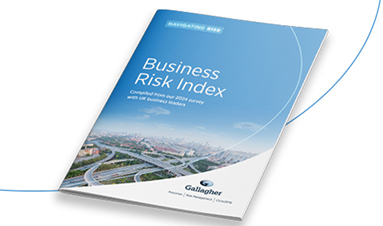An analysis of the most pressing concerns based on insights from 1,000 UK business leaders.
What are the top five insurance mistakes that businesses should avoid when navigating the complexities of commercial insurance?
1. Underinsuring your business

Over time, the value of a business' assets and the cost of rebuilding or replacing them can increase due to inflation. Failing to account for inflation in coverage limits can leave your business underinsured. Regularly review coverage limits to ensure they keep pace with inflation. Ensure you understand the total value of your property, equipment, inventory, and liabilities to ensure proper coverage.
Your business is dynamic, and its insurance needs also change over time. Failing to review and update your policies regularly can leave you underinsured or with coverage gaps. Take the time to reassess your insurance needs annually or whenever significant changes occur.
2. Not creating the right programme
Standard insurance policies may not cover all the unique risks your business faces. Depending on your industry and operations, consider additional coverage options such as cyber insurance, business interruption (BI) insurance, or public liability insurance.
Insurance policies often have exclusions and limitations that define what is not covered. Failing to understand these provisions can lead to unpleasant surprises when filing a claim. Carefully review your policy wording and seek clarification from your insurance broker if needed.
Location plays a significant role in insurance premiums and coverage. If your business operates in an area prone to natural disasters, floods, or crime, ensure that your insurance adequately covers these risks.
3. Overlooking the importance of risk management
In the complex landscape of modern business, effective risk management is not just a luxury—it's a necessity. Despite this, many companies make the critical mistake of overlooking the importance of a robust risk management strategy when it comes to their insurance needs. This oversight can lead to significant financial and operational repercussions.
Risk management is the process of identifying, assessing, and prioritising potential risks to a business, followed by coordinated efforts to minimise, monitor, and control the probability or impact of those risks. Without this foundational step, businesses are essentially leaving their fate to chance. They may find themselves inadequately prepared for unforeseen events ranging from natural disasters and cyber-attacks to employee injuries and supply chain disruptions.
4. Failing to analyse data and claims trends
Businesses are inundated with data, but many fail to harness its full potential when it comes to insurance. Ignoring the valuable insights that can be gleaned from analysing claims data and trends is a significant oversight. By not delving into past claims, companies miss out on identifying patterns that could inform future risk management strategies.
For instance, a consistent spike in employee liability claims in a particular department could indicate underlying safety issues that need addressing. Similarly, an uptick in property damage claims during specific seasons might reveal vulnerabilities that could be mitigated with preventive measures. Without this analysis, businesses are essentially flying blind, unable to pinpoint areas of concern that could be rectified to reduce future claims.
Moreover, understanding claims trends can also lead to more informed negotiations with insurers. When businesses can demonstrate a data-driven approach to risk management, they are often in a stronger position to secure favourable terms and premiums. Conversely, a lack of awareness can result in generic policies that may not be tailored to the business’s unique risk profile, potentially leaving critical exposures unaddressed.
5. Not consulting with an experienced insurance broker
Insurance can be complex, and making uninformed decisions can have severe consequences. Working with an insurance broker who understands your industry can guide you through the process of selecting appropriate coverage for your business.
Avoiding these common insurance mistakes is critical to protecting your business and ensuring its long-term success. By investing time and effort into understanding your insurance needs, working with knowledgeable professionals, and regularly reviewing and updating your policies, you can avoid potential pitfalls and ensure your business is adequately protected.

